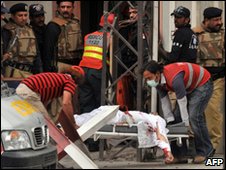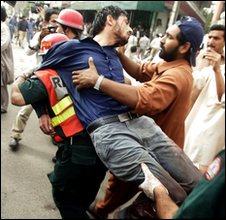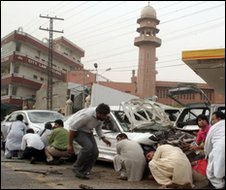 |
Page last updated at 15:01 GMT, Wednesday, 16 June 2010 16:01 UK |
Why Pakistan’s Ahmadi community is officially detested
By Mohammed Hanif
BBC News, Karachi
BBC News, Karachi
 | |
More than 80 Ahmadis were killed last months in two atacks in Lahore |
The oath goes like this: “I consider Mirza Ghulam Ahmad an impostor prophet. And also consider his followers, whether belonging to the Lahori or Qadiani group, to be non-Muslims.”
Like millions of other Pakistanis, I have signed this oath several times without giving much thought to exactly what Mr Ahmad stands for, or what the technical difference between Lahoris or Qadianis is. I want my passport, and if I have to sign up to a fatwa to get it, so be it.
But like millions of people from my generation I also remember that when I was growing up, the minority Ahmadi sect were considered just another Muslim sect.
Non-Muslims
Like scores of others I had friends who were Ahmadis. We played cricket together, and sometimes, when our parents ordered us off to the mosque, we even prayed side by side.
 | |
Ahmadis are despised by many Pakistanis |
There were street protests by religious parties against Ahmadis demanding that they should be declared non-Muslims.
One day I saw some bearded activists standing outside a clothes merchant’s shop in our town, chanting anti-Ahmadi slogans and turning customers away, telling them that buying clothes from Ahmadis was haram - forbidden.
At the time I was learning to memorise the Koran from a very kind, mild-mannered teacher.
I asked him what exactly was wrong with the Ahmadis.
He explained to me that they didn’t believe that the Prophet Muhammad was the last and the final messenger.
I said OK, maybe that makes them kafirs, infidels, but who says that kafirs can’t sell cloth?
My teacher’s response was a full-handed slap, so sudden, so unexpected that it rang in my ears for days to come.
That same year Pakistan’s first elected parliament declared Ahmadis non-Muslims.
Then in 1984 Pakistan’s military dictator and self-appointed guardian of the faith General Zia-ul-Haq inserted that oath in the constitution that we are all required to sign.
Because of the new laws, Ahmadis have been sent to prison simply for using the Muslim greeting Assalamu alaikum, or putting a Koranic verse in a greeting card.
Heretic
Over the last three decades the hatred against Ahmadis has become so widespread that Pakistan is now embarrassed by the only Nobel laureate it has ever produced.
 | |
Attacks on Ahmadis are beconing increasingly commonplace |
But he was an Ahmadi so there is no monument to celebrate him, no universities named after him.
The word “Muslim” on his gravestone has been erased. Even the town he is buried in has been renamed in an attempt to erase our collective memory.
This hatred was evident in the reactions to the massacre.
TV channels were more obsessed with making sure that in their broadcasts Ahmadi mosques were called “places of worship”.
When you refuse to call a place of worship by its proper name, you are implying that it’s not a mosque, it’s not a church, it’s not a synagogue, it’s a place where godless people do godless things.
And all the various Islamic political parties, whose leaders often refuse to pray together, are united on this.
When Pakistan’s main opposition leader Nawaz Sharif used the phrase “our brothers” for the murdered Ahmadis, leaders from 11 political parties came together to condemn him and threatened to issue a fatwa declaring him a heretic.
Over the last three decades the siege has been so palpable that those Ahmadis who couldn’t afford to emigrate have taken to hiding their identity.
If you want to destroy someone in public life it’s enough to drop a hint that they are Ahmadi.
In the 1980s, the former chief minister of Punjab and current federal minister didn’t attend his own mother’s funeral because there were rumours that she was an Ahmadi.
When the funerals of the massacred Ahmadis took place there were no officials, no politicians present.
Pakistan’s liberal bloggers and some English-language columnists did write along the lines that Ahmadi blood is on our hands.
Others were adamant that it was yet another Friday, yet another massacre by the Pakistani Taliban, and we should just fight this sort of terrorism and leave the sectarian debates alone.
Two incidents in the past week made me realise how pathological our response was. At a vigil to mark the massacre, where a handful of people had turned up, a passer-by asked me “Are you an Ahmadi?” My own loud and aggressive denial surprised me.
Then an Ahmadi friend whose father survived the Lahore massacre wrote to me saying: “You know we have been living like this for decades. [Did] something like this have to happen for you to speak up?”








